Sustainability - Interruption
VerifiedAdded on 2022/04/06
|12
|3535
|182
AI Summary
The concept of sustainability become so important nowadays, because of the irreparable damage caused to the environment by industrial civilization & consumerism. This document contains various concepts like Social-Environmental and Economic Sustainability. It also contains The Kyoto Protocol and the relationship between technology and sustainability.
Contribute Materials
Your contribution can guide someone’s learning journey. Share your
documents today.
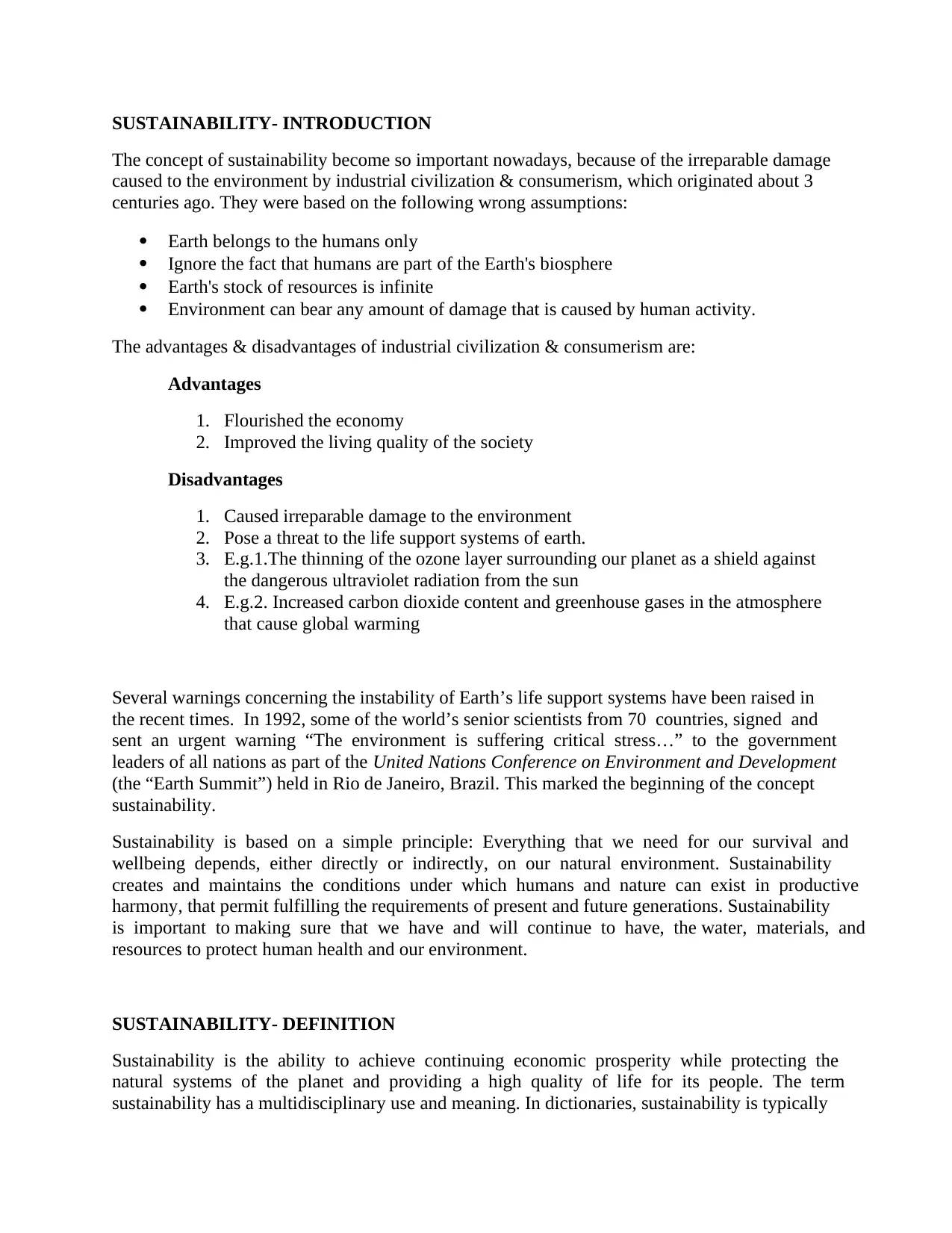
SUSTAINABILITY- INTRODUCTION
The concept of sustainability become so important nowadays, because of the irreparable damage
caused to the environment by industrial civilization & consumerism, which originated about 3
centuries ago. They were based on the following wrong assumptions:
Earth belongs to the humans only
Ignore the fact that humans are part of the Earth's biosphere
Earth's stock of resources is infinite
Environment can bear any amount of damage that is caused by human activity.
The advantages & disadvantages of industrial civilization & consumerism are:
Advantages
1. Flourished the economy
2. Improved the living quality of the society
Disadvantages
1. Caused irreparable damage to the environment
2. Pose a threat to the life support systems of earth.
3. E.g.1.The thinning of the ozone layer surrounding our planet as a shield against
the dangerous ultraviolet radiation from the sun
4. E.g.2. Increased carbon dioxide content and greenhouse gases in the atmosphere
that cause global warming
Several warnings concerning the instability of Earth’s life support systems have been raised in
the recent times. In 1992, some of the world’s senior scientists from 70 countries, signed and
sent an urgent warning “The environment is suffering critical stress…” to the government
leaders of all nations as part of the United Nations Conference on Environment and Development
(the “Earth Summit”) held in Rio de Janeiro, Brazil. This marked the beginning of the concept
sustainability.
Sustainability is based on a simple principle: Everything that we need for our survival and
wellbeing depends, either directly or indirectly, on our natural environment. Sustainability
creates and maintains the conditions under which humans and nature can exist in productive
harmony, that permit fulfilling the requirements of present and future generations. Sustainability
is important to making sure that we have and will continue to have, the water, materials, and
resources to protect human health and our environment.
SUSTAINABILITY- DEFINITION
Sustainability is the ability to achieve continuing economic prosperity while protecting the
natural systems of the planet and providing a high quality of life for its people. The term
sustainability has a multidisciplinary use and meaning. In dictionaries, sustainability is typically
The concept of sustainability become so important nowadays, because of the irreparable damage
caused to the environment by industrial civilization & consumerism, which originated about 3
centuries ago. They were based on the following wrong assumptions:
Earth belongs to the humans only
Ignore the fact that humans are part of the Earth's biosphere
Earth's stock of resources is infinite
Environment can bear any amount of damage that is caused by human activity.
The advantages & disadvantages of industrial civilization & consumerism are:
Advantages
1. Flourished the economy
2. Improved the living quality of the society
Disadvantages
1. Caused irreparable damage to the environment
2. Pose a threat to the life support systems of earth.
3. E.g.1.The thinning of the ozone layer surrounding our planet as a shield against
the dangerous ultraviolet radiation from the sun
4. E.g.2. Increased carbon dioxide content and greenhouse gases in the atmosphere
that cause global warming
Several warnings concerning the instability of Earth’s life support systems have been raised in
the recent times. In 1992, some of the world’s senior scientists from 70 countries, signed and
sent an urgent warning “The environment is suffering critical stress…” to the government
leaders of all nations as part of the United Nations Conference on Environment and Development
(the “Earth Summit”) held in Rio de Janeiro, Brazil. This marked the beginning of the concept
sustainability.
Sustainability is based on a simple principle: Everything that we need for our survival and
wellbeing depends, either directly or indirectly, on our natural environment. Sustainability
creates and maintains the conditions under which humans and nature can exist in productive
harmony, that permit fulfilling the requirements of present and future generations. Sustainability
is important to making sure that we have and will continue to have, the water, materials, and
resources to protect human health and our environment.
SUSTAINABILITY- DEFINITION
Sustainability is the ability to achieve continuing economic prosperity while protecting the
natural systems of the planet and providing a high quality of life for its people. The term
sustainability has a multidisciplinary use and meaning. In dictionaries, sustainability is typically
Secure Best Marks with AI Grader
Need help grading? Try our AI Grader for instant feedback on your assignments.
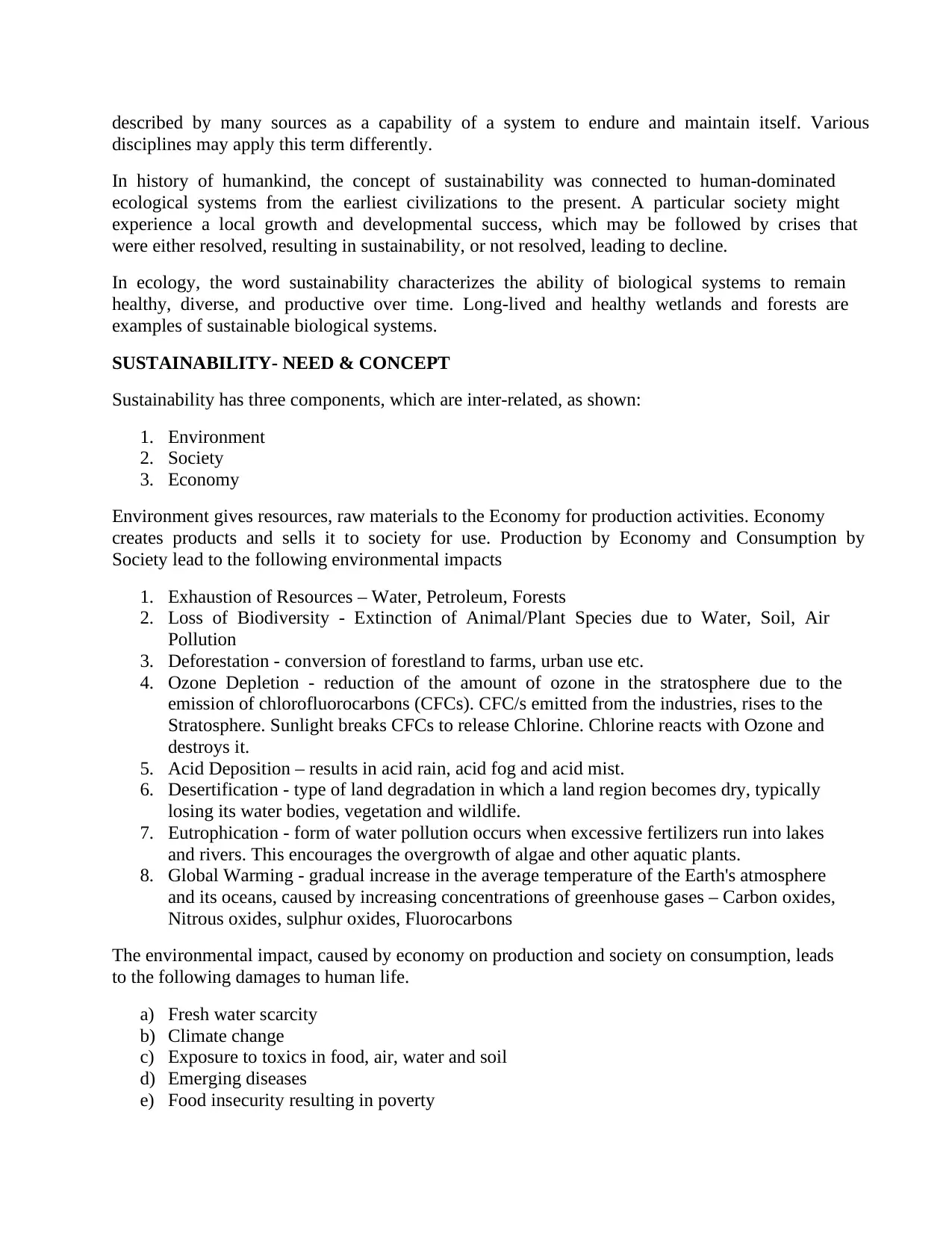
described by many sources as a capability of a system to endure and maintain itself. Various
disciplines may apply this term differently.
In history of humankind, the concept of sustainability was connected to human-dominated
ecological systems from the earliest civilizations to the present. A particular society might
experience a local growth and developmental success, which may be followed by crises that
were either resolved, resulting in sustainability, or not resolved, leading to decline.
In ecology, the word sustainability characterizes the ability of biological systems to remain
healthy, diverse, and productive over time. Long-lived and healthy wetlands and forests are
examples of sustainable biological systems.
SUSTAINABILITY- NEED & CONCEPT
Sustainability has three components, which are inter-related, as shown:
1. Environment
2. Society
3. Economy
Environment gives resources, raw materials to the Economy for production activities. Economy
creates products and sells it to society for use. Production by Economy and Consumption by
Society lead to the following environmental impacts
1. Exhaustion of Resources – Water, Petroleum, Forests
2. Loss of Biodiversity - Extinction of Animal/Plant Species due to Water, Soil, Air
Pollution
3. Deforestation - conversion of forestland to farms, urban use etc.
4. Ozone Depletion - reduction of the amount of ozone in the stratosphere due to the
emission of chlorofluorocarbons (CFCs). CFC/s emitted from the industries, rises to the
Stratosphere. Sunlight breaks CFCs to release Chlorine. Chlorine reacts with Ozone and
destroys it.
5. Acid Deposition – results in acid rain, acid fog and acid mist.
6. Desertification - type of land degradation in which a land region becomes dry, typically
losing its water bodies, vegetation and wildlife.
7. Eutrophication - form of water pollution occurs when excessive fertilizers run into lakes
and rivers. This encourages the overgrowth of algae and other aquatic plants.
8. Global Warming - gradual increase in the average temperature of the Earth's atmosphere
and its oceans, caused by increasing concentrations of greenhouse gases – Carbon oxides,
Nitrous oxides, sulphur oxides, Fluorocarbons
The environmental impact, caused by economy on production and society on consumption, leads
to the following damages to human life.
a) Fresh water scarcity
b) Climate change
c) Exposure to toxics in food, air, water and soil
d) Emerging diseases
e) Food insecurity resulting in poverty
disciplines may apply this term differently.
In history of humankind, the concept of sustainability was connected to human-dominated
ecological systems from the earliest civilizations to the present. A particular society might
experience a local growth and developmental success, which may be followed by crises that
were either resolved, resulting in sustainability, or not resolved, leading to decline.
In ecology, the word sustainability characterizes the ability of biological systems to remain
healthy, diverse, and productive over time. Long-lived and healthy wetlands and forests are
examples of sustainable biological systems.
SUSTAINABILITY- NEED & CONCEPT
Sustainability has three components, which are inter-related, as shown:
1. Environment
2. Society
3. Economy
Environment gives resources, raw materials to the Economy for production activities. Economy
creates products and sells it to society for use. Production by Economy and Consumption by
Society lead to the following environmental impacts
1. Exhaustion of Resources – Water, Petroleum, Forests
2. Loss of Biodiversity - Extinction of Animal/Plant Species due to Water, Soil, Air
Pollution
3. Deforestation - conversion of forestland to farms, urban use etc.
4. Ozone Depletion - reduction of the amount of ozone in the stratosphere due to the
emission of chlorofluorocarbons (CFCs). CFC/s emitted from the industries, rises to the
Stratosphere. Sunlight breaks CFCs to release Chlorine. Chlorine reacts with Ozone and
destroys it.
5. Acid Deposition – results in acid rain, acid fog and acid mist.
6. Desertification - type of land degradation in which a land region becomes dry, typically
losing its water bodies, vegetation and wildlife.
7. Eutrophication - form of water pollution occurs when excessive fertilizers run into lakes
and rivers. This encourages the overgrowth of algae and other aquatic plants.
8. Global Warming - gradual increase in the average temperature of the Earth's atmosphere
and its oceans, caused by increasing concentrations of greenhouse gases – Carbon oxides,
Nitrous oxides, sulphur oxides, Fluorocarbons
The environmental impact, caused by economy on production and society on consumption, leads
to the following damages to human life.
a) Fresh water scarcity
b) Climate change
c) Exposure to toxics in food, air, water and soil
d) Emerging diseases
e) Food insecurity resulting in poverty
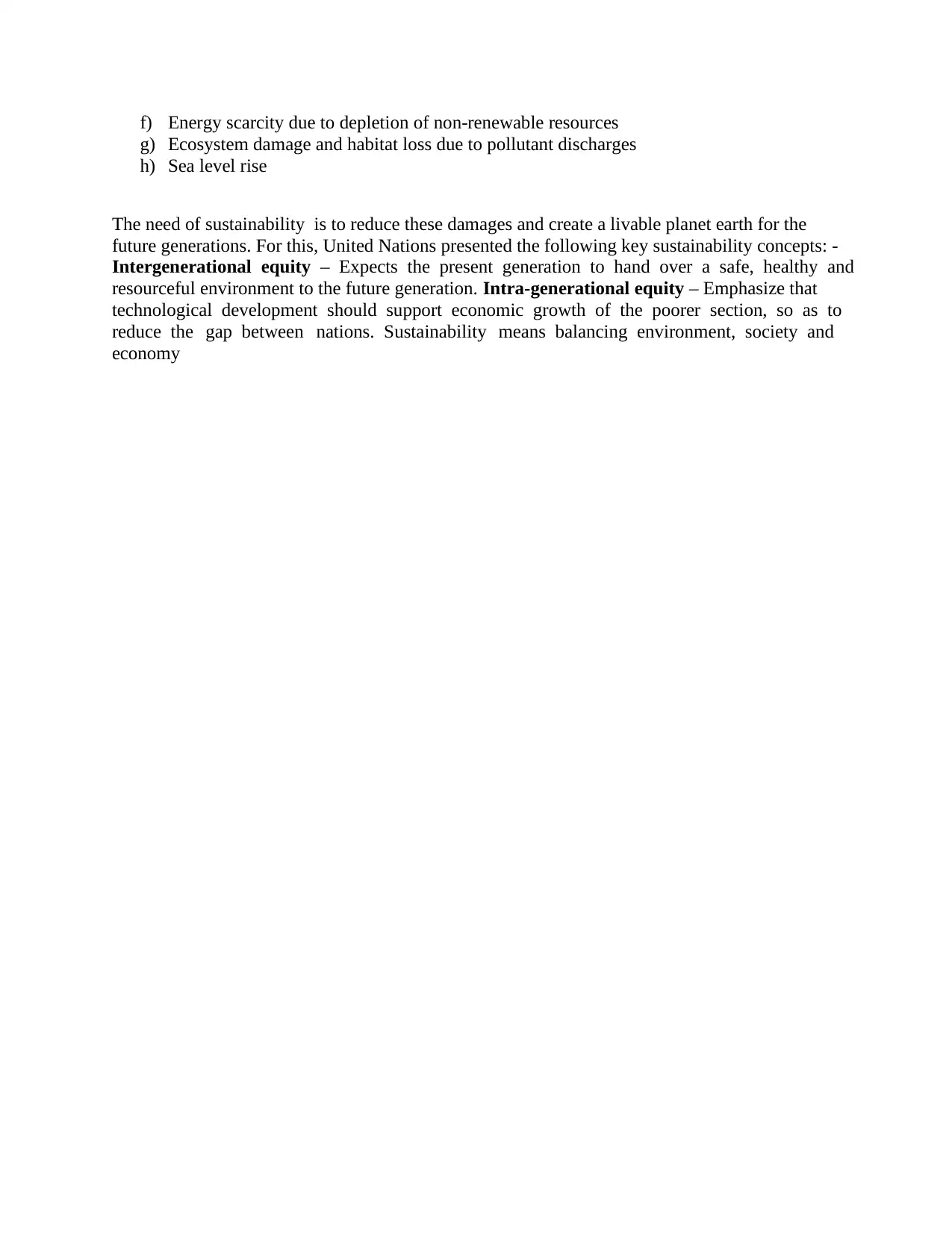
f) Energy scarcity due to depletion of non-renewable resources
g) Ecosystem damage and habitat loss due to pollutant discharges
h) Sea level rise
The need of sustainability is to reduce these damages and create a livable planet earth for the
future generations. For this, United Nations presented the following key sustainability concepts: -
Intergenerational equity – Expects the present generation to hand over a safe, healthy and
resourceful environment to the future generation. Intra-generational equity – Emphasize that
technological development should support economic growth of the poorer section, so as to
reduce the gap between nations. Sustainability means balancing environment, society and
economy
g) Ecosystem damage and habitat loss due to pollutant discharges
h) Sea level rise
The need of sustainability is to reduce these damages and create a livable planet earth for the
future generations. For this, United Nations presented the following key sustainability concepts: -
Intergenerational equity – Expects the present generation to hand over a safe, healthy and
resourceful environment to the future generation. Intra-generational equity – Emphasize that
technological development should support economic growth of the poorer section, so as to
reduce the gap between nations. Sustainability means balancing environment, society and
economy
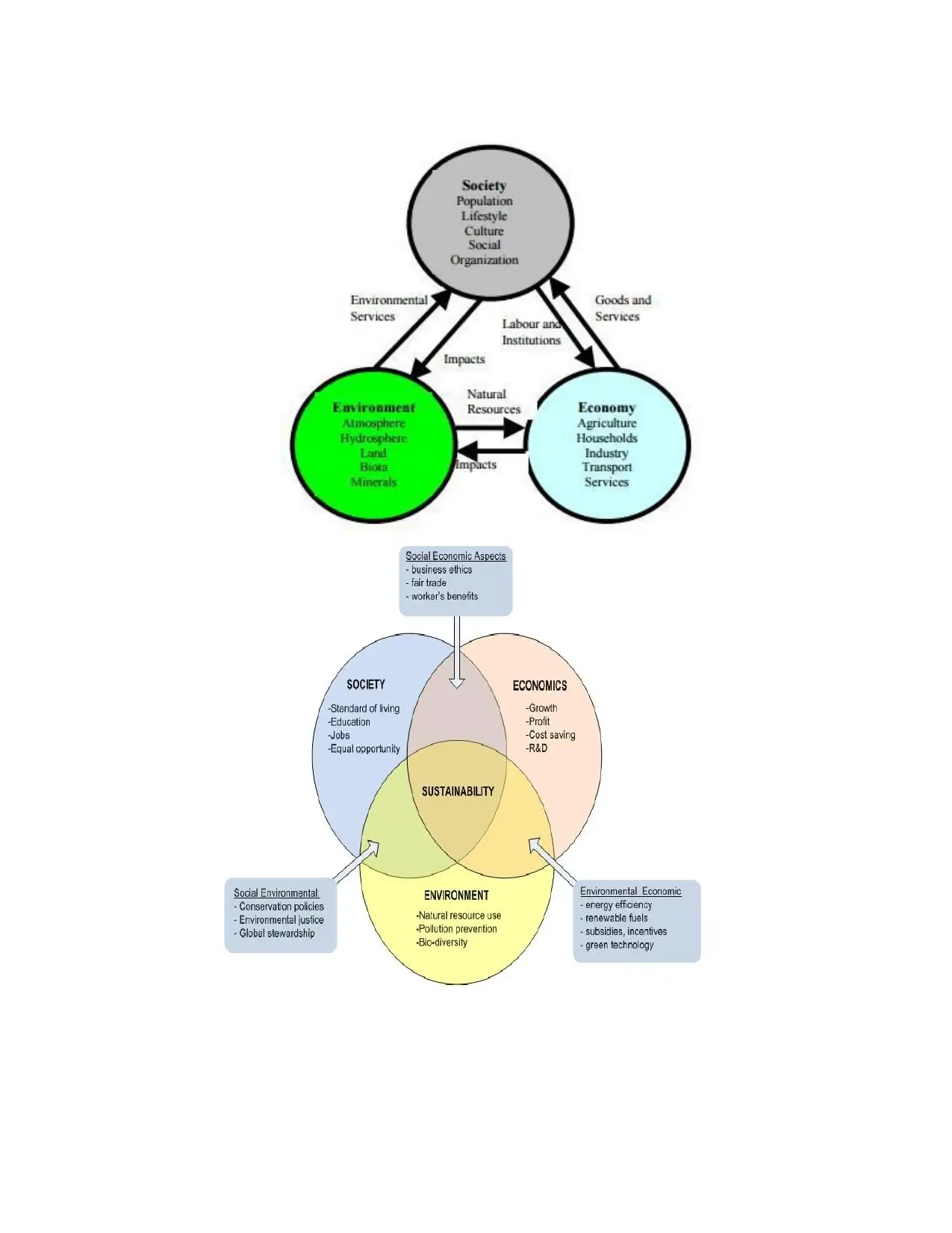
Secure Best Marks with AI Grader
Need help grading? Try our AI Grader for instant feedback on your assignments.
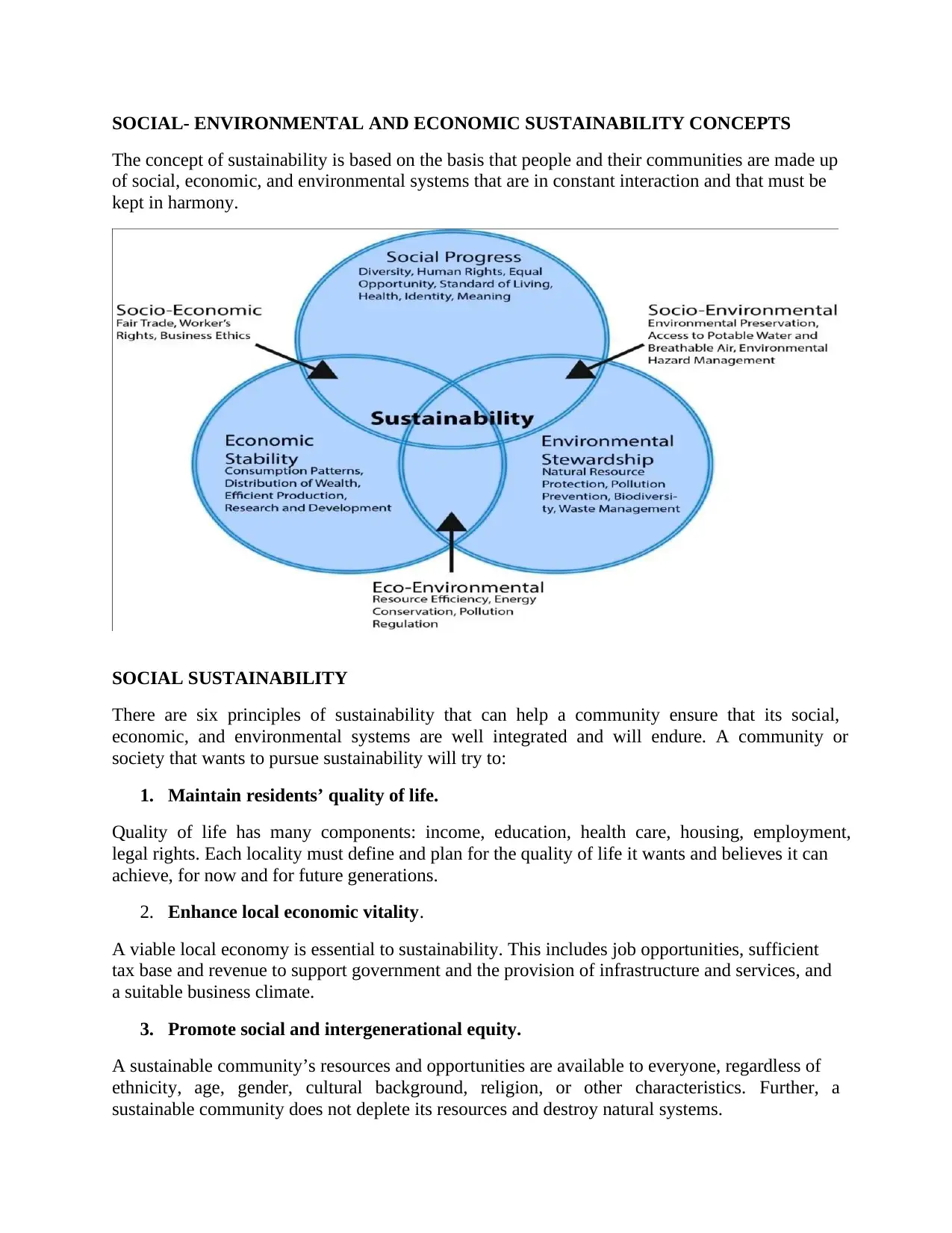
SOCIAL- ENVIRONMENTAL AND ECONOMIC SUSTAINABILITY CONCEPTS
The concept of sustainability is based on the basis that people and their communities are made up
of social, economic, and environmental systems that are in constant interaction and that must be
kept in harmony.
SOCIAL SUSTAINABILITY
There are six principles of sustainability that can help a community ensure that its social,
economic, and environmental systems are well integrated and will endure. A community or
society that wants to pursue sustainability will try to:
1. Maintain residents’ quality of life.
Quality of life has many components: income, education, health care, housing, employment,
legal rights. Each locality must define and plan for the quality of life it wants and believes it can
achieve, for now and for future generations.
2. Enhance local economic vitality.
A viable local economy is essential to sustainability. This includes job opportunities, sufficient
tax base and revenue to support government and the provision of infrastructure and services, and
a suitable business climate.
3. Promote social and intergenerational equity.
A sustainable community’s resources and opportunities are available to everyone, regardless of
ethnicity, age, gender, cultural background, religion, or other characteristics. Further, a
sustainable community does not deplete its resources and destroy natural systems.
The concept of sustainability is based on the basis that people and their communities are made up
of social, economic, and environmental systems that are in constant interaction and that must be
kept in harmony.
SOCIAL SUSTAINABILITY
There are six principles of sustainability that can help a community ensure that its social,
economic, and environmental systems are well integrated and will endure. A community or
society that wants to pursue sustainability will try to:
1. Maintain residents’ quality of life.
Quality of life has many components: income, education, health care, housing, employment,
legal rights. Each locality must define and plan for the quality of life it wants and believes it can
achieve, for now and for future generations.
2. Enhance local economic vitality.
A viable local economy is essential to sustainability. This includes job opportunities, sufficient
tax base and revenue to support government and the provision of infrastructure and services, and
a suitable business climate.
3. Promote social and intergenerational equity.
A sustainable community’s resources and opportunities are available to everyone, regardless of
ethnicity, age, gender, cultural background, religion, or other characteristics. Further, a
sustainable community does not deplete its resources and destroy natural systems.
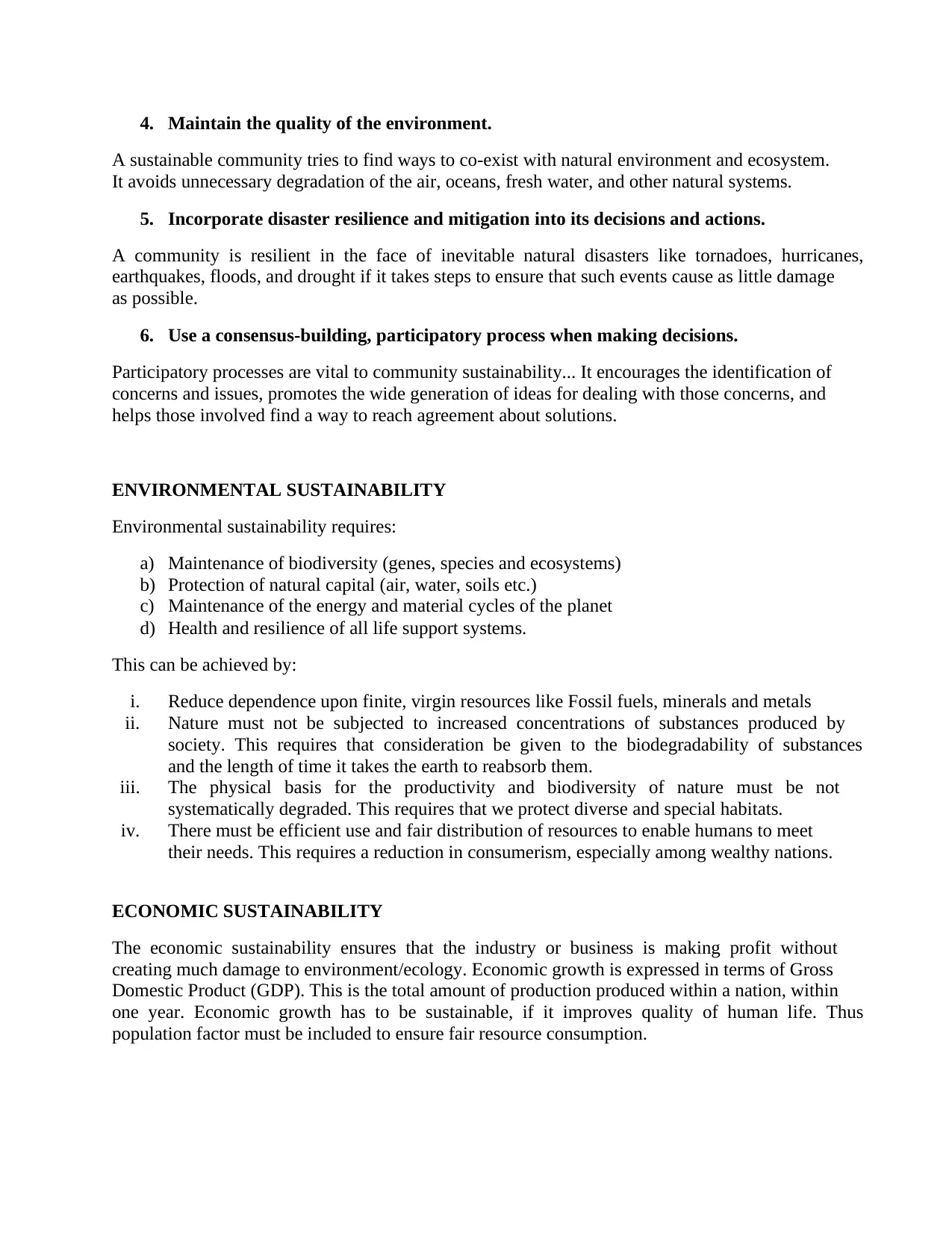
4. Maintain the quality of the environment.
A sustainable community tries to find ways to co-exist with natural environment and ecosystem.
It avoids unnecessary degradation of the air, oceans, fresh water, and other natural systems.
5. Incorporate disaster resilience and mitigation into its decisions and actions.
A community is resilient in the face of inevitable natural disasters like tornadoes, hurricanes,
earthquakes, floods, and drought if it takes steps to ensure that such events cause as little damage
as possible.
6. Use a consensus-building, participatory process when making decisions.
Participatory processes are vital to community sustainability... It encourages the identification of
concerns and issues, promotes the wide generation of ideas for dealing with those concerns, and
helps those involved find a way to reach agreement about solutions.
ENVIRONMENTAL SUSTAINABILITY
Environmental sustainability requires:
a) Maintenance of biodiversity (genes, species and ecosystems)
b) Protection of natural capital (air, water, soils etc.)
c) Maintenance of the energy and material cycles of the planet
d) Health and resilience of all life support systems.
This can be achieved by:
i. Reduce dependence upon finite, virgin resources like Fossil fuels, minerals and metals
ii. Nature must not be subjected to increased concentrations of substances produced by
society. This requires that consideration be given to the biodegradability of substances
and the length of time it takes the earth to reabsorb them.
iii. The physical basis for the productivity and biodiversity of nature must be not
systematically degraded. This requires that we protect diverse and special habitats.
iv. There must be efficient use and fair distribution of resources to enable humans to meet
their needs. This requires a reduction in consumerism, especially among wealthy nations.
ECONOMIC SUSTAINABILITY
The economic sustainability ensures that the industry or business is making profit without
creating much damage to environment/ecology. Economic growth is expressed in terms of Gross
Domestic Product (GDP). This is the total amount of production produced within a nation, within
one year. Economic growth has to be sustainable, if it improves quality of human life. Thus
population factor must be included to ensure fair resource consumption.
A sustainable community tries to find ways to co-exist with natural environment and ecosystem.
It avoids unnecessary degradation of the air, oceans, fresh water, and other natural systems.
5. Incorporate disaster resilience and mitigation into its decisions and actions.
A community is resilient in the face of inevitable natural disasters like tornadoes, hurricanes,
earthquakes, floods, and drought if it takes steps to ensure that such events cause as little damage
as possible.
6. Use a consensus-building, participatory process when making decisions.
Participatory processes are vital to community sustainability... It encourages the identification of
concerns and issues, promotes the wide generation of ideas for dealing with those concerns, and
helps those involved find a way to reach agreement about solutions.
ENVIRONMENTAL SUSTAINABILITY
Environmental sustainability requires:
a) Maintenance of biodiversity (genes, species and ecosystems)
b) Protection of natural capital (air, water, soils etc.)
c) Maintenance of the energy and material cycles of the planet
d) Health and resilience of all life support systems.
This can be achieved by:
i. Reduce dependence upon finite, virgin resources like Fossil fuels, minerals and metals
ii. Nature must not be subjected to increased concentrations of substances produced by
society. This requires that consideration be given to the biodegradability of substances
and the length of time it takes the earth to reabsorb them.
iii. The physical basis for the productivity and biodiversity of nature must be not
systematically degraded. This requires that we protect diverse and special habitats.
iv. There must be efficient use and fair distribution of resources to enable humans to meet
their needs. This requires a reduction in consumerism, especially among wealthy nations.
ECONOMIC SUSTAINABILITY
The economic sustainability ensures that the industry or business is making profit without
creating much damage to environment/ecology. Economic growth is expressed in terms of Gross
Domestic Product (GDP). This is the total amount of production produced within a nation, within
one year. Economic growth has to be sustainable, if it improves quality of human life. Thus
population factor must be included to ensure fair resource consumption.
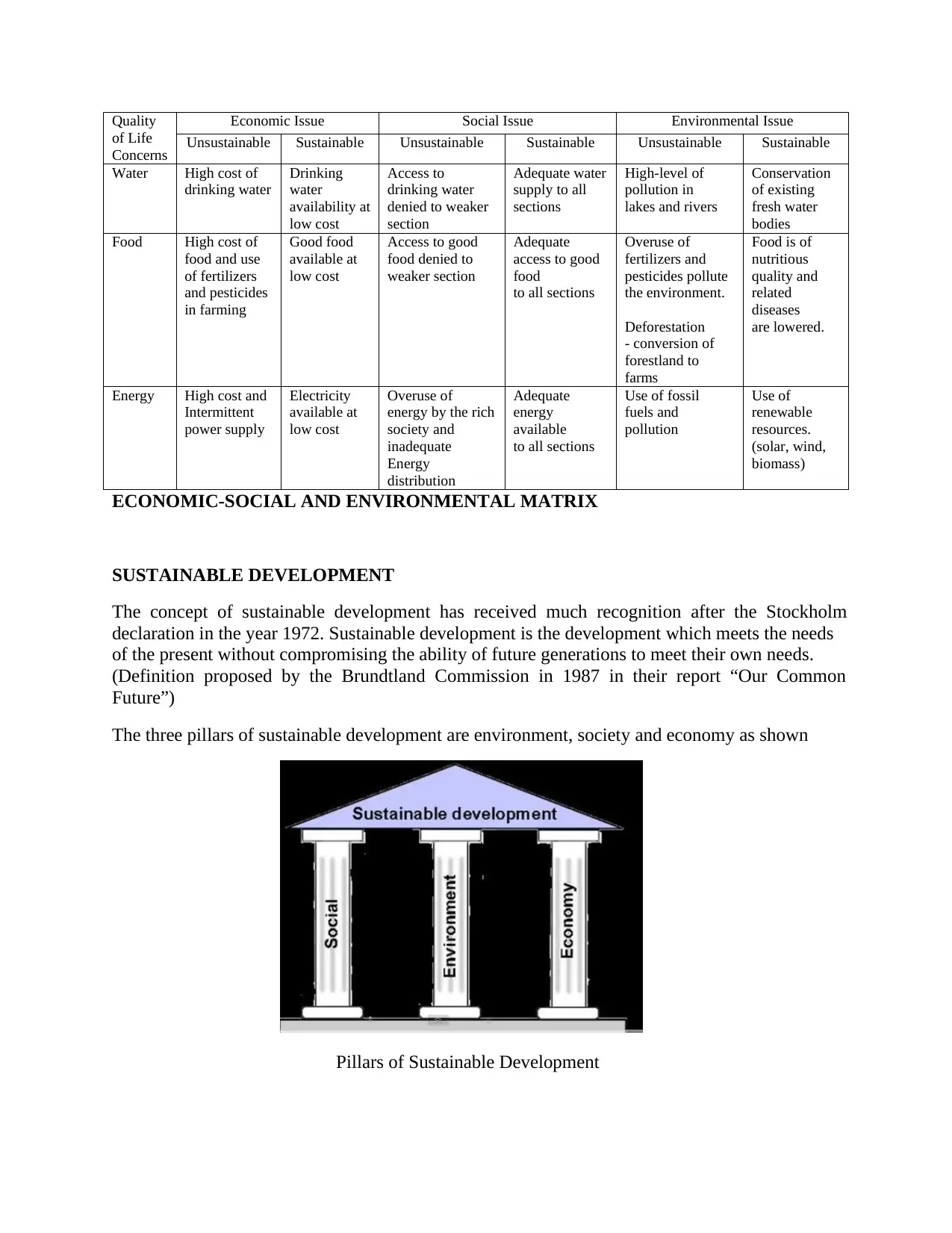
Quality
of Life
Concerns
Economic Issue Social Issue Environmental Issue
Unsustainable Sustainable Unsustainable Sustainable Unsustainable Sustainable
Water High cost of
drinking water
Drinking
water
availability at
low cost
Access to
drinking water
denied to weaker
section
Adequate water
supply to all
sections
High-level of
pollution in
lakes and rivers
Conservation
of existing
fresh water
bodies
Food High cost of
food and use
of fertilizers
and pesticides
in farming
Good food
available at
low cost
Access to good
food denied to
weaker section
Adequate
access to good
food
to all sections
Overuse of
fertilizers and
pesticides pollute
the environment.
Deforestation
- conversion of
forestland to
farms
Food is of
nutritious
quality and
related
diseases
are lowered.
Energy High cost and
Intermittent
power supply
Electricity
available at
low cost
Overuse of
energy by the rich
society and
inadequate
Energy
distribution
Adequate
energy
available
to all sections
Use of fossil
fuels and
pollution
Use of
renewable
resources.
(solar, wind,
biomass)
ECONOMIC-SOCIAL AND ENVIRONMENTAL MATRIX
SUSTAINABLE DEVELOPMENT
The concept of sustainable development has received much recognition after the Stockholm
declaration in the year 1972. Sustainable development is the development which meets the needs
of the present without compromising the ability of future generations to meet their own needs.
(Definition proposed by the Brundtland Commission in 1987 in their report “Our Common
Future”)
The three pillars of sustainable development are environment, society and economy as shown
Pillars of Sustainable Development
of Life
Concerns
Economic Issue Social Issue Environmental Issue
Unsustainable Sustainable Unsustainable Sustainable Unsustainable Sustainable
Water High cost of
drinking water
Drinking
water
availability at
low cost
Access to
drinking water
denied to weaker
section
Adequate water
supply to all
sections
High-level of
pollution in
lakes and rivers
Conservation
of existing
fresh water
bodies
Food High cost of
food and use
of fertilizers
and pesticides
in farming
Good food
available at
low cost
Access to good
food denied to
weaker section
Adequate
access to good
food
to all sections
Overuse of
fertilizers and
pesticides pollute
the environment.
Deforestation
- conversion of
forestland to
farms
Food is of
nutritious
quality and
related
diseases
are lowered.
Energy High cost and
Intermittent
power supply
Electricity
available at
low cost
Overuse of
energy by the rich
society and
inadequate
Energy
distribution
Adequate
energy
available
to all sections
Use of fossil
fuels and
pollution
Use of
renewable
resources.
(solar, wind,
biomass)
ECONOMIC-SOCIAL AND ENVIRONMENTAL MATRIX
SUSTAINABLE DEVELOPMENT
The concept of sustainable development has received much recognition after the Stockholm
declaration in the year 1972. Sustainable development is the development which meets the needs
of the present without compromising the ability of future generations to meet their own needs.
(Definition proposed by the Brundtland Commission in 1987 in their report “Our Common
Future”)
The three pillars of sustainable development are environment, society and economy as shown
Pillars of Sustainable Development
Paraphrase This Document
Need a fresh take? Get an instant paraphrase of this document with our AI Paraphraser
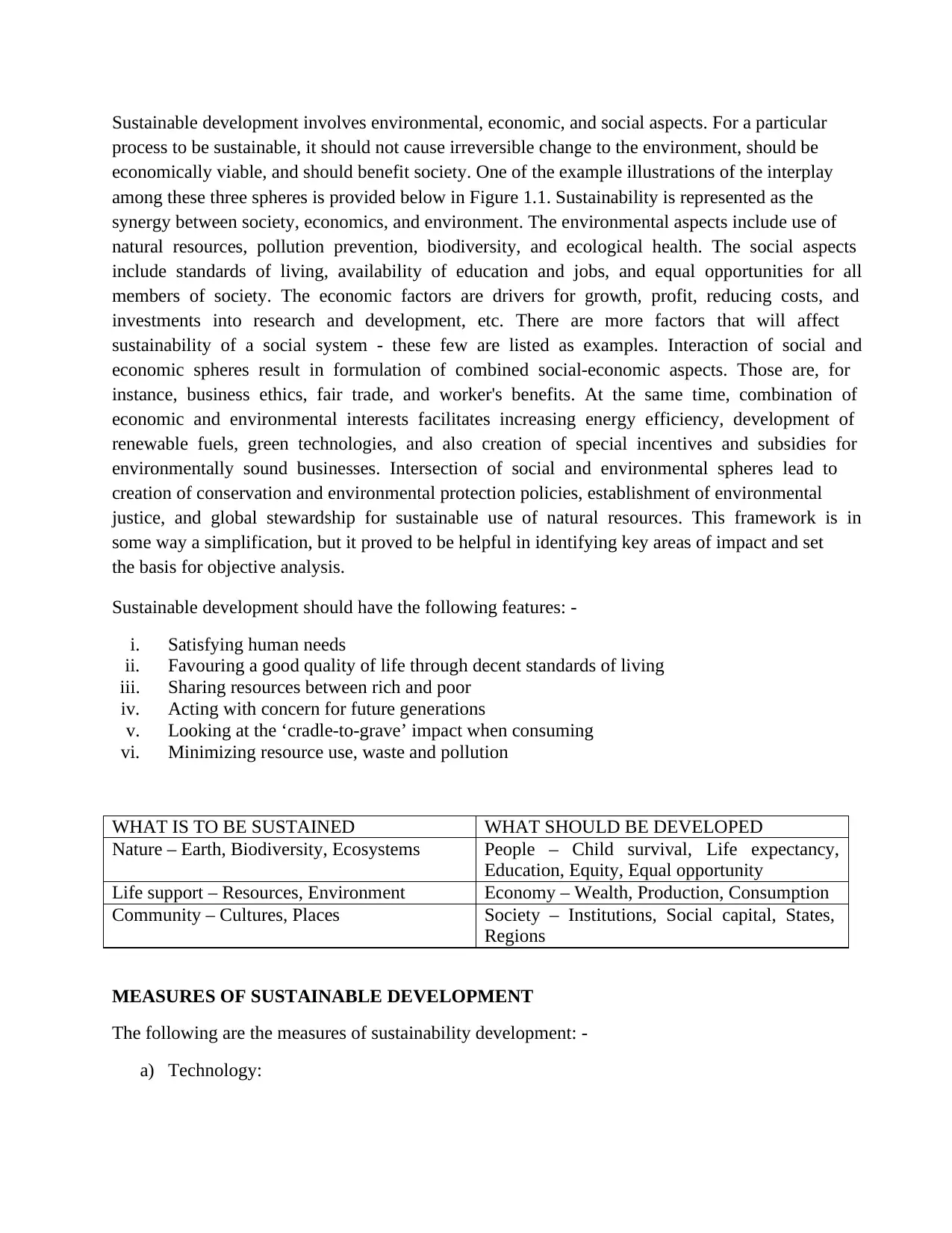
Sustainable development involves environmental, economic, and social aspects. For a particular
process to be sustainable, it should not cause irreversible change to the environment, should be
economically viable, and should benefit society. One of the example illustrations of the interplay
among these three spheres is provided below in Figure 1.1. Sustainability is represented as the
synergy between society, economics, and environment. The environmental aspects include use of
natural resources, pollution prevention, biodiversity, and ecological health. The social aspects
include standards of living, availability of education and jobs, and equal opportunities for all
members of society. The economic factors are drivers for growth, profit, reducing costs, and
investments into research and development, etc. There are more factors that will affect
sustainability of a social system - these few are listed as examples. Interaction of social and
economic spheres result in formulation of combined social-economic aspects. Those are, for
instance, business ethics, fair trade, and worker's benefits. At the same time, combination of
economic and environmental interests facilitates increasing energy efficiency, development of
renewable fuels, green technologies, and also creation of special incentives and subsidies for
environmentally sound businesses. Intersection of social and environmental spheres lead to
creation of conservation and environmental protection policies, establishment of environmental
justice, and global stewardship for sustainable use of natural resources. This framework is in
some way a simplification, but it proved to be helpful in identifying key areas of impact and set
the basis for objective analysis.
Sustainable development should have the following features: -
i. Satisfying human needs
ii. Favouring a good quality of life through decent standards of living
iii. Sharing resources between rich and poor
iv. Acting with concern for future generations
v. Looking at the ‘cradle-to-grave’ impact when consuming
vi. Minimizing resource use, waste and pollution
WHAT IS TO BE SUSTAINED WHAT SHOULD BE DEVELOPED
Nature – Earth, Biodiversity, Ecosystems People – Child survival, Life expectancy,
Education, Equity, Equal opportunity
Life support – Resources, Environment Economy – Wealth, Production, Consumption
Community – Cultures, Places Society – Institutions, Social capital, States,
Regions
MEASURES OF SUSTAINABLE DEVELOPMENT
The following are the measures of sustainability development: -
a) Technology:
process to be sustainable, it should not cause irreversible change to the environment, should be
economically viable, and should benefit society. One of the example illustrations of the interplay
among these three spheres is provided below in Figure 1.1. Sustainability is represented as the
synergy between society, economics, and environment. The environmental aspects include use of
natural resources, pollution prevention, biodiversity, and ecological health. The social aspects
include standards of living, availability of education and jobs, and equal opportunities for all
members of society. The economic factors are drivers for growth, profit, reducing costs, and
investments into research and development, etc. There are more factors that will affect
sustainability of a social system - these few are listed as examples. Interaction of social and
economic spheres result in formulation of combined social-economic aspects. Those are, for
instance, business ethics, fair trade, and worker's benefits. At the same time, combination of
economic and environmental interests facilitates increasing energy efficiency, development of
renewable fuels, green technologies, and also creation of special incentives and subsidies for
environmentally sound businesses. Intersection of social and environmental spheres lead to
creation of conservation and environmental protection policies, establishment of environmental
justice, and global stewardship for sustainable use of natural resources. This framework is in
some way a simplification, but it proved to be helpful in identifying key areas of impact and set
the basis for objective analysis.
Sustainable development should have the following features: -
i. Satisfying human needs
ii. Favouring a good quality of life through decent standards of living
iii. Sharing resources between rich and poor
iv. Acting with concern for future generations
v. Looking at the ‘cradle-to-grave’ impact when consuming
vi. Minimizing resource use, waste and pollution
WHAT IS TO BE SUSTAINED WHAT SHOULD BE DEVELOPED
Nature – Earth, Biodiversity, Ecosystems People – Child survival, Life expectancy,
Education, Equity, Equal opportunity
Life support – Resources, Environment Economy – Wealth, Production, Consumption
Community – Cultures, Places Society – Institutions, Social capital, States,
Regions
MEASURES OF SUSTAINABLE DEVELOPMENT
The following are the measures of sustainability development: -
a) Technology:
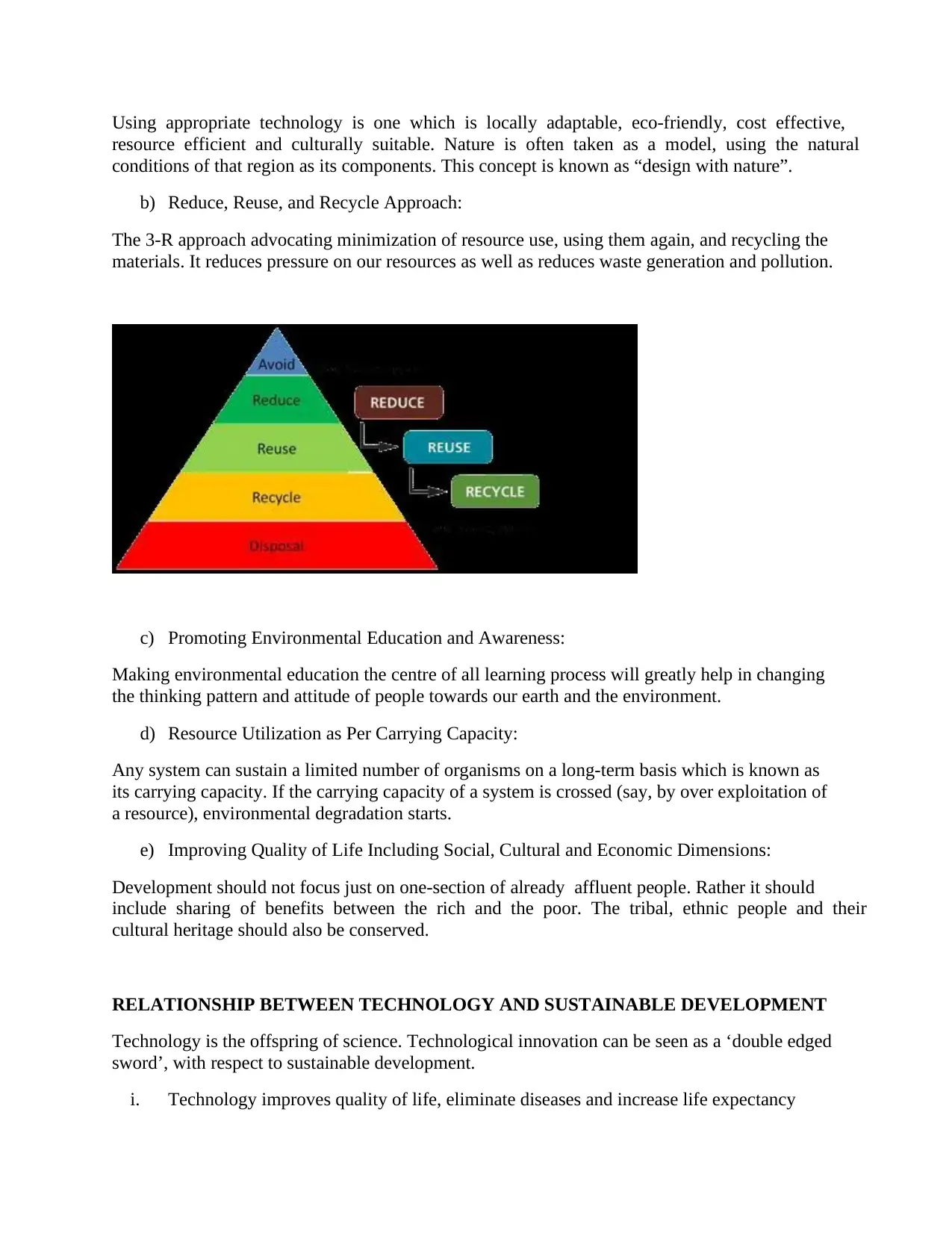
Using appropriate technology is one which is locally adaptable, eco-friendly, cost effective,
resource efficient and culturally suitable. Nature is often taken as a model, using the natural
conditions of that region as its components. This concept is known as “design with nature”.
b) Reduce, Reuse, and Recycle Approach:
The 3-R approach advocating minimization of resource use, using them again, and recycling the
materials. It reduces pressure on our resources as well as reduces waste generation and pollution.
c) Promoting Environmental Education and Awareness:
Making environmental education the centre of all learning process will greatly help in changing
the thinking pattern and attitude of people towards our earth and the environment.
d) Resource Utilization as Per Carrying Capacity:
Any system can sustain a limited number of organisms on a long-term basis which is known as
its carrying capacity. If the carrying capacity of a system is crossed (say, by over exploitation of
a resource), environmental degradation starts.
e) Improving Quality of Life Including Social, Cultural and Economic Dimensions:
Development should not focus just on one-section of already affluent people. Rather it should
include sharing of benefits between the rich and the poor. The tribal, ethnic people and their
cultural heritage should also be conserved.
RELATIONSHIP BETWEEN TECHNOLOGY AND SUSTAINABLE DEVELOPMENT
Technology is the offspring of science. Technological innovation can be seen as a ‘double edged
sword’, with respect to sustainable development.
i. Technology improves quality of life, eliminate diseases and increase life expectancy
resource efficient and culturally suitable. Nature is often taken as a model, using the natural
conditions of that region as its components. This concept is known as “design with nature”.
b) Reduce, Reuse, and Recycle Approach:
The 3-R approach advocating minimization of resource use, using them again, and recycling the
materials. It reduces pressure on our resources as well as reduces waste generation and pollution.
c) Promoting Environmental Education and Awareness:
Making environmental education the centre of all learning process will greatly help in changing
the thinking pattern and attitude of people towards our earth and the environment.
d) Resource Utilization as Per Carrying Capacity:
Any system can sustain a limited number of organisms on a long-term basis which is known as
its carrying capacity. If the carrying capacity of a system is crossed (say, by over exploitation of
a resource), environmental degradation starts.
e) Improving Quality of Life Including Social, Cultural and Economic Dimensions:
Development should not focus just on one-section of already affluent people. Rather it should
include sharing of benefits between the rich and the poor. The tribal, ethnic people and their
cultural heritage should also be conserved.
RELATIONSHIP BETWEEN TECHNOLOGY AND SUSTAINABLE DEVELOPMENT
Technology is the offspring of science. Technological innovation can be seen as a ‘double edged
sword’, with respect to sustainable development.
i. Technology improves quality of life, eliminate diseases and increase life expectancy
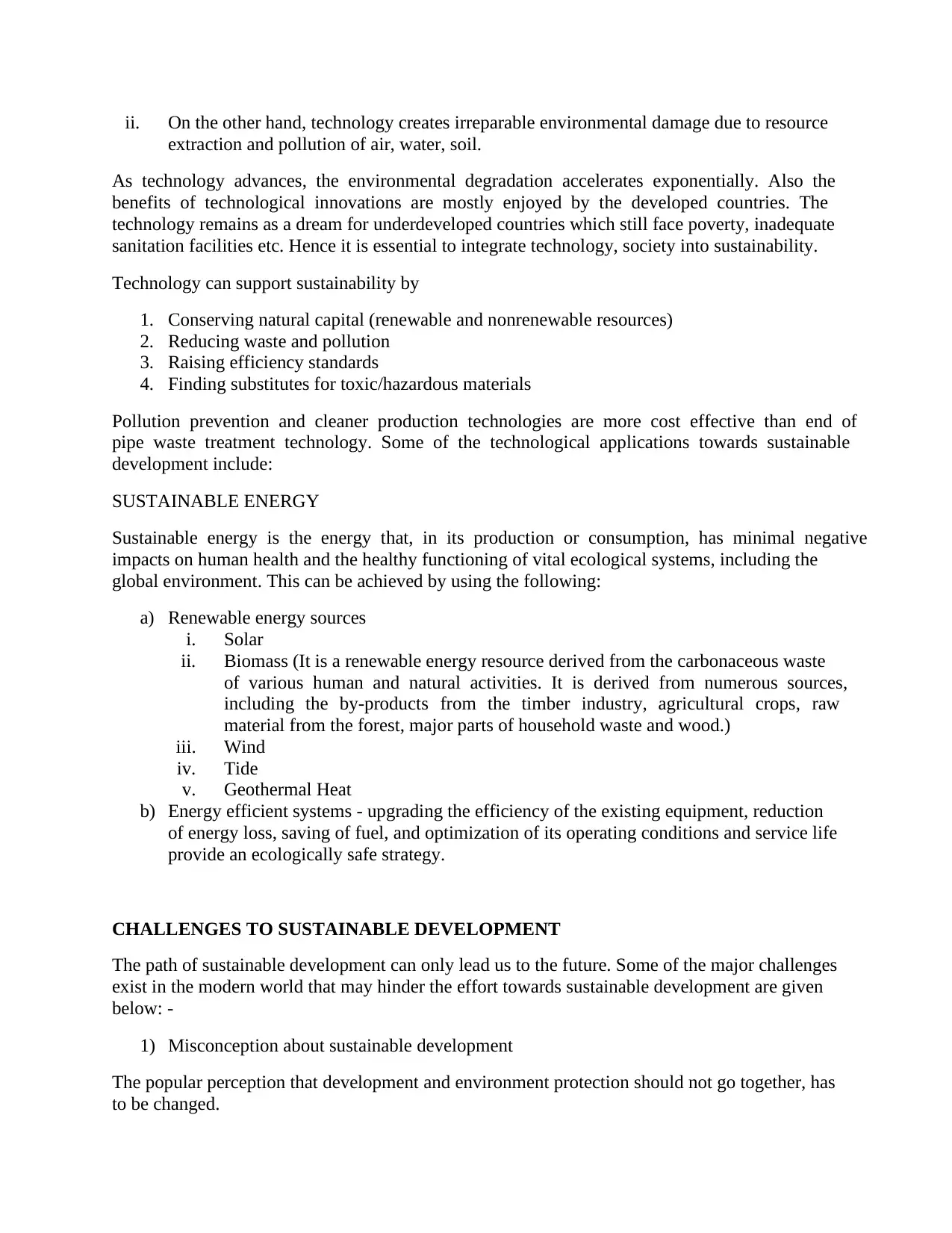
ii. On the other hand, technology creates irreparable environmental damage due to resource
extraction and pollution of air, water, soil.
As technology advances, the environmental degradation accelerates exponentially. Also the
benefits of technological innovations are mostly enjoyed by the developed countries. The
technology remains as a dream for underdeveloped countries which still face poverty, inadequate
sanitation facilities etc. Hence it is essential to integrate technology, society into sustainability.
Technology can support sustainability by
1. Conserving natural capital (renewable and nonrenewable resources)
2. Reducing waste and pollution
3. Raising efficiency standards
4. Finding substitutes for toxic/hazardous materials
Pollution prevention and cleaner production technologies are more cost effective than end of
pipe waste treatment technology. Some of the technological applications towards sustainable
development include:
SUSTAINABLE ENERGY
Sustainable energy is the energy that, in its production or consumption, has minimal negative
impacts on human health and the healthy functioning of vital ecological systems, including the
global environment. This can be achieved by using the following:
a) Renewable energy sources
i. Solar
ii. Biomass (It is a renewable energy resource derived from the carbonaceous waste
of various human and natural activities. It is derived from numerous sources,
including the by-products from the timber industry, agricultural crops, raw
material from the forest, major parts of household waste and wood.)
iii. Wind
iv. Tide
v. Geothermal Heat
b) Energy efficient systems - upgrading the efficiency of the existing equipment, reduction
of energy loss, saving of fuel, and optimization of its operating conditions and service life
provide an ecologically safe strategy.
CHALLENGES TO SUSTAINABLE DEVELOPMENT
The path of sustainable development can only lead us to the future. Some of the major challenges
exist in the modern world that may hinder the effort towards sustainable development are given
below: -
1) Misconception about sustainable development
The popular perception that development and environment protection should not go together, has
to be changed.
extraction and pollution of air, water, soil.
As technology advances, the environmental degradation accelerates exponentially. Also the
benefits of technological innovations are mostly enjoyed by the developed countries. The
technology remains as a dream for underdeveloped countries which still face poverty, inadequate
sanitation facilities etc. Hence it is essential to integrate technology, society into sustainability.
Technology can support sustainability by
1. Conserving natural capital (renewable and nonrenewable resources)
2. Reducing waste and pollution
3. Raising efficiency standards
4. Finding substitutes for toxic/hazardous materials
Pollution prevention and cleaner production technologies are more cost effective than end of
pipe waste treatment technology. Some of the technological applications towards sustainable
development include:
SUSTAINABLE ENERGY
Sustainable energy is the energy that, in its production or consumption, has minimal negative
impacts on human health and the healthy functioning of vital ecological systems, including the
global environment. This can be achieved by using the following:
a) Renewable energy sources
i. Solar
ii. Biomass (It is a renewable energy resource derived from the carbonaceous waste
of various human and natural activities. It is derived from numerous sources,
including the by-products from the timber industry, agricultural crops, raw
material from the forest, major parts of household waste and wood.)
iii. Wind
iv. Tide
v. Geothermal Heat
b) Energy efficient systems - upgrading the efficiency of the existing equipment, reduction
of energy loss, saving of fuel, and optimization of its operating conditions and service life
provide an ecologically safe strategy.
CHALLENGES TO SUSTAINABLE DEVELOPMENT
The path of sustainable development can only lead us to the future. Some of the major challenges
exist in the modern world that may hinder the effort towards sustainable development are given
below: -
1) Misconception about sustainable development
The popular perception that development and environment protection should not go together, has
to be changed.
Secure Best Marks with AI Grader
Need help grading? Try our AI Grader for instant feedback on your assignments.
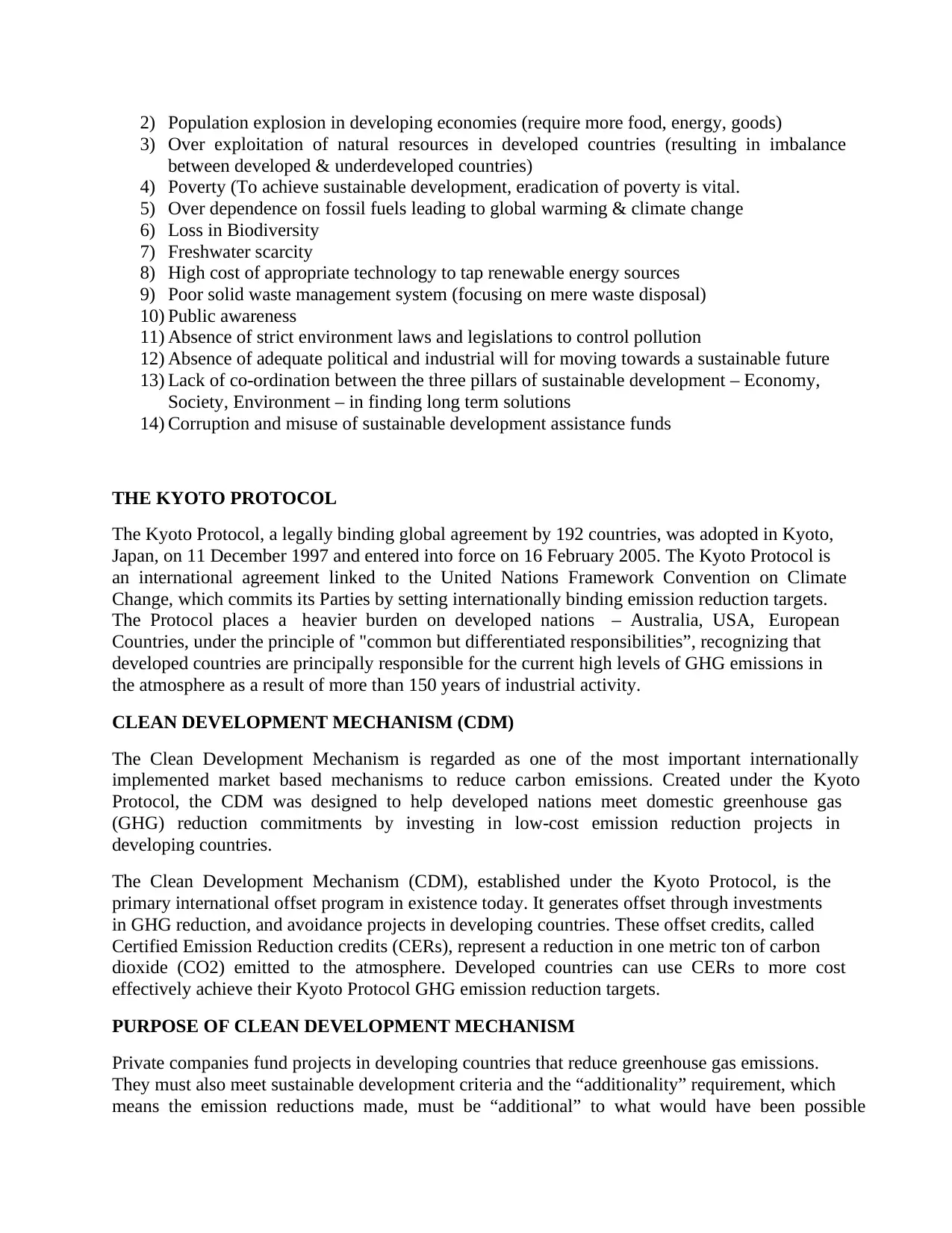
2) Population explosion in developing economies (require more food, energy, goods)
3) Over exploitation of natural resources in developed countries (resulting in imbalance
between developed & underdeveloped countries)
4) Poverty (To achieve sustainable development, eradication of poverty is vital.
5) Over dependence on fossil fuels leading to global warming & climate change
6) Loss in Biodiversity
7) Freshwater scarcity
8) High cost of appropriate technology to tap renewable energy sources
9) Poor solid waste management system (focusing on mere waste disposal)
10) Public awareness
11) Absence of strict environment laws and legislations to control pollution
12) Absence of adequate political and industrial will for moving towards a sustainable future
13) Lack of co-ordination between the three pillars of sustainable development – Economy,
Society, Environment – in finding long term solutions
14) Corruption and misuse of sustainable development assistance funds
THE KYOTO PROTOCOL
The Kyoto Protocol, a legally binding global agreement by 192 countries, was adopted in Kyoto,
Japan, on 11 December 1997 and entered into force on 16 February 2005. The Kyoto Protocol is
an international agreement linked to the United Nations Framework Convention on Climate
Change, which commits its Parties by setting internationally binding emission reduction targets.
The Protocol places a heavier burden on developed nations – Australia, USA, European
Countries, under the principle of "common but differentiated responsibilities”, recognizing that
developed countries are principally responsible for the current high levels of GHG emissions in
the atmosphere as a result of more than 150 years of industrial activity.
CLEAN DEVELOPMENT MECHANISM (CDM)
The Clean Development Mechanism is regarded as one of the most important internationally
implemented market based mechanisms to reduce carbon emissions. Created under the Kyoto
Protocol, the CDM was designed to help developed nations meet domestic greenhouse gas
(GHG) reduction commitments by investing in low-cost emission reduction projects in
developing countries.
The Clean Development Mechanism (CDM), established under the Kyoto Protocol, is the
primary international offset program in existence today. It generates offset through investments
in GHG reduction, and avoidance projects in developing countries. These offset credits, called
Certified Emission Reduction credits (CERs), represent a reduction in one metric ton of carbon
dioxide (CO2) emitted to the atmosphere. Developed countries can use CERs to more cost
effectively achieve their Kyoto Protocol GHG emission reduction targets.
PURPOSE OF CLEAN DEVELOPMENT MECHANISM
Private companies fund projects in developing countries that reduce greenhouse gas emissions.
They must also meet sustainable development criteria and the “additionality” requirement, which
means the emission reductions made, must be “additional” to what would have been possible
3) Over exploitation of natural resources in developed countries (resulting in imbalance
between developed & underdeveloped countries)
4) Poverty (To achieve sustainable development, eradication of poverty is vital.
5) Over dependence on fossil fuels leading to global warming & climate change
6) Loss in Biodiversity
7) Freshwater scarcity
8) High cost of appropriate technology to tap renewable energy sources
9) Poor solid waste management system (focusing on mere waste disposal)
10) Public awareness
11) Absence of strict environment laws and legislations to control pollution
12) Absence of adequate political and industrial will for moving towards a sustainable future
13) Lack of co-ordination between the three pillars of sustainable development – Economy,
Society, Environment – in finding long term solutions
14) Corruption and misuse of sustainable development assistance funds
THE KYOTO PROTOCOL
The Kyoto Protocol, a legally binding global agreement by 192 countries, was adopted in Kyoto,
Japan, on 11 December 1997 and entered into force on 16 February 2005. The Kyoto Protocol is
an international agreement linked to the United Nations Framework Convention on Climate
Change, which commits its Parties by setting internationally binding emission reduction targets.
The Protocol places a heavier burden on developed nations – Australia, USA, European
Countries, under the principle of "common but differentiated responsibilities”, recognizing that
developed countries are principally responsible for the current high levels of GHG emissions in
the atmosphere as a result of more than 150 years of industrial activity.
CLEAN DEVELOPMENT MECHANISM (CDM)
The Clean Development Mechanism is regarded as one of the most important internationally
implemented market based mechanisms to reduce carbon emissions. Created under the Kyoto
Protocol, the CDM was designed to help developed nations meet domestic greenhouse gas
(GHG) reduction commitments by investing in low-cost emission reduction projects in
developing countries.
The Clean Development Mechanism (CDM), established under the Kyoto Protocol, is the
primary international offset program in existence today. It generates offset through investments
in GHG reduction, and avoidance projects in developing countries. These offset credits, called
Certified Emission Reduction credits (CERs), represent a reduction in one metric ton of carbon
dioxide (CO2) emitted to the atmosphere. Developed countries can use CERs to more cost
effectively achieve their Kyoto Protocol GHG emission reduction targets.
PURPOSE OF CLEAN DEVELOPMENT MECHANISM
Private companies fund projects in developing countries that reduce greenhouse gas emissions.
They must also meet sustainable development criteria and the “additionality” requirement, which
means the emission reductions made, must be “additional” to what would have been possible
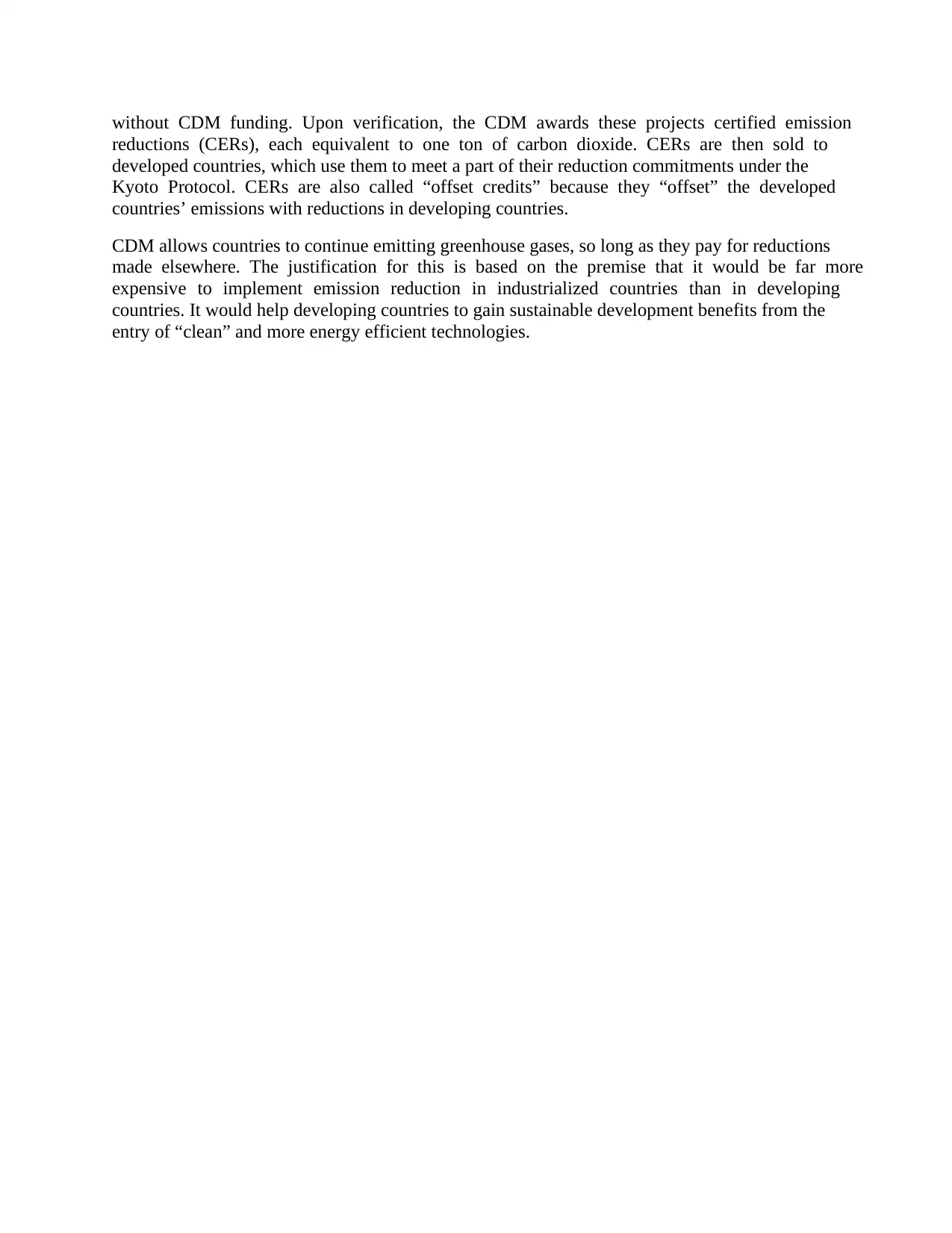
without CDM funding. Upon verification, the CDM awards these projects certified emission
reductions (CERs), each equivalent to one ton of carbon dioxide. CERs are then sold to
developed countries, which use them to meet a part of their reduction commitments under the
Kyoto Protocol. CERs are also called “offset credits” because they “offset” the developed
countries’ emissions with reductions in developing countries.
CDM allows countries to continue emitting greenhouse gases, so long as they pay for reductions
made elsewhere. The justification for this is based on the premise that it would be far more
expensive to implement emission reduction in industrialized countries than in developing
countries. It would help developing countries to gain sustainable development benefits from the
entry of “clean” and more energy efficient technologies.
reductions (CERs), each equivalent to one ton of carbon dioxide. CERs are then sold to
developed countries, which use them to meet a part of their reduction commitments under the
Kyoto Protocol. CERs are also called “offset credits” because they “offset” the developed
countries’ emissions with reductions in developing countries.
CDM allows countries to continue emitting greenhouse gases, so long as they pay for reductions
made elsewhere. The justification for this is based on the premise that it would be far more
expensive to implement emission reduction in industrialized countries than in developing
countries. It would help developing countries to gain sustainable development benefits from the
entry of “clean” and more energy efficient technologies.
1 out of 12
Related Documents
Your All-in-One AI-Powered Toolkit for Academic Success.
+13062052269
info@desklib.com
Available 24*7 on WhatsApp / Email
![[object Object]](/_next/static/media/star-bottom.7253800d.svg)
Unlock your academic potential
© 2024 | Zucol Services PVT LTD | All rights reserved.





